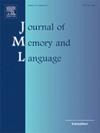工作记忆容量、情景记忆能力或流体智力的个体差异是否会缓和前测效应?
IF 3
1区 心理学
Q1 LINGUISTICS
引用次数: 0
摘要
预测效应指的是在知道正确答案之前先猜测测试问题的答案,相对于不事先猜测的学习(或阅读)可以提高记忆力。虽然前测效应是强大的,并已在多个研究中得到证实,但其大小因个体而异。两项研究调查了工作记忆容量(WMC)、情景记忆能力(EM)和/或流体智力(gF)的个体差异是否有助于解释这种差异。在研究1中,较低的gF分数与更大的前测效应相关,这是由于大学生在阅读项目上的表现较差。在研究2中,涉及成人在线参与者,观察到的模式不太一致,但较低的WMC分数与较大的前测效应相关,这也是由于阅读项目的较低表现。总之,这些模式表明,预测试可以使个体的记忆能力同质化,尽管在一定程度上可能因学习者群体和认知能力而异。这一结论和其他发现是在相关的个体差异研究和与预测试和记忆现象相关的理论的背景下解释的。本文章由计算机程序翻译,如有差异,请以英文原文为准。
Do individual differences in working memory capacity, episodic memory ability, or fluid intelligence moderate the pretesting effect?
The pretesting effect refers to the finding that guessing the answers to test questions before learning the correct answers improves memory relative to studying (or reading) without prior guessing. Although the pretesting effect is robust and has been demonstrated across multiple studies, its magnitude varies across individuals. Two studies investigated whether individual differences in working memory capacity (WMC), episodic memory ability (EM), and/or fluid intelligence (gF) help explain that variation. In Study 1, lower gF scores were associated with a larger pretesting effect among undergraduate students, stemming from lower performance on read items. In Study 2, involving adult online participants, observed patterns were less consistent, but lower WMC scores were associated with larger pretesting effects, again due to lower performance on read items. Together, these patterns suggest that pretesting can homologize memory ability across individuals, although to an extent that may vary across learner populations and cognitive abilities. That conclusion and other findings are interpreted in the context of relevant individual differences research and theories related to pretesting and memory phenomena.
求助全文
通过发布文献求助,成功后即可免费获取论文全文。
去求助
来源期刊
CiteScore
8.70
自引率
14.00%
发文量
49
审稿时长
12.7 weeks
期刊介绍:
Articles in the Journal of Memory and Language contribute to the formulation of scientific issues and theories in the areas of memory, language comprehension and production, and cognitive processes. Special emphasis is given to research articles that provide new theoretical insights based on a carefully laid empirical foundation. The journal generally favors articles that provide multiple experiments. In addition, significant theoretical papers without new experimental findings may be published.
The Journal of Memory and Language is a valuable tool for cognitive scientists, including psychologists, linguists, and others interested in memory and learning, language, reading, and speech.
Research Areas include:
• Topics that illuminate aspects of memory or language processing
• Linguistics
• Neuropsychology.

 求助内容:
求助内容: 应助结果提醒方式:
应助结果提醒方式:


